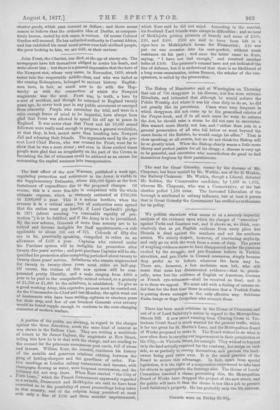The first effect of the new Warrant, published a week
ago, regulating promotion and retirement in the Army, is visible in the Supplementary Estimates, where £60,000 figure as the first instalment of expenditure due to the proposed changes. Of course, this is a mere flea-bite in comparison with the whole ultimate expense, which is variously estimated at £350,000 to £500,000 a year. This is a serious burthen, when the revenue is in a critical state ; but all authorities seem agreed that the nation must pay heavily, if Lord Cardwell's pledge in 1871 (about securing "a reasonable rapidity of pro- motion ") is to be fulfilled, and if the Army is to be juvenilised. By the new scheme, Generals of more than seventy are to be retired and become ineligible for Staff appointments,—a rule applicable to about 100 out of 375. Colonels of fifty-five are to be, practically speaking, compelled to retire on an allowance of £420 a year. Captains who entered under the Purchase system will be ineligible for promotion after twenty-five years' service ; and post-purchase Captains will be dis- qualified for promotion after completing periodsof about twenty to twenty-three years' service. Subalterns who remain unpromoted for twenty to twenty-three years must retire on half-pay. Of course, the victims of this new system will be com- pensated pretty liberally, and a scale ranging from £600 a year to be paid to the compulsorily-retired colonel, to a gratuity of £1,700 or £1,800 to the subaltern, is established. To give us a good working Army, this expensive process must be carried out. As the Commander-in-Chief said last Monday, the spirit went out of lieutenants who have been waiting eighteen or nineteen years for their step, and few of our hundred Generals over seventy would be found supple enough to conform to the ever-changing character of modern warfare.


































 Previous page
Previous page